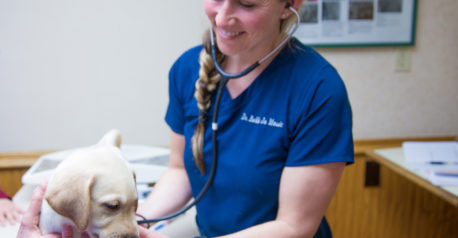Preventative Health Care For Dogs
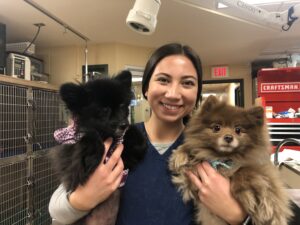
What is preventive health care for dogs?
Being a responsible pet parent means doing everything in your power to minimize risk and avoid encounters with harmful conditions. When it comes to the health of humans and animals alike, it is a fundamental truth that “an ounce of prevention is worth a pound of cure.”
A health problem is usually easier and less costly to prevent than it is to treat. Our veterinarians want what’s best for you and your dog, and we love to educate clients in the preventative health care measures to keep dogs from developing any potentially avoidable problems.
At the Animal Clinic of Billings and Animal Surgery Clinic, our veterinarians believe the secret to achieving a long, happy, and healthy life for any dog involves regular veterinary checkups and screening tests (blood, urine, and fecal testing), as well as staying up to date on preventive care interventions.
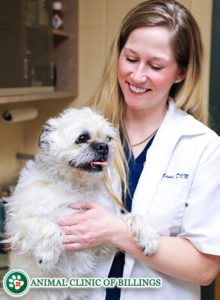
Many diseases to which dogs are susceptible can either be prevented or detected early enough to make treatment much more effective. When a disease is diagnosed at a later stage, treatment is often more intensive (and expensive), the risk of complications is greater, and often the long-term prognosis is not as good as if early detection and treatment had been implemented. Because of this, it is impossible to overstate the importance of regular veterinary exams, routine labwork, and preventive care.
How do our veterinarians prevent diseases in dogs?
At the Animal Clinic of Billings and Animal Surgery Clinic, our veterinarians and support staff love educating our clients about the many ways we can work together to minimize your dog’s risk of contracting preventable conditions. We take great pride in providing our canine patients in and around the Billings area with the highest standard of veterinary care to keep our clients and their dogs as happy and healthy as possible for many years to come.
Your Dog’s Annual Physical Exam
Physical examinations are an integral component of every canine wellness program. A physical examination allows your veterinarian to detect any physical abnormalities that may indicate the presence of illness or injury. It is also an opportunity for your vet to determine if your dog is over- or under-weight, and to generate a weight management plan if necessary.
During your dog’s physical exam, one of our veterinarians will address the following topics:
- Parasite Control and Deworming
- Vaccination Status
- Labwork (blood, urine, and fecal testing)
- Dental Health
- Activity and Exercise
- Behavior
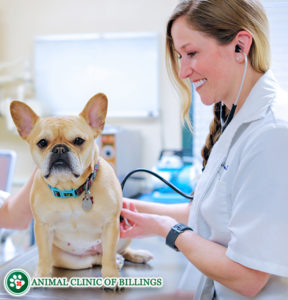 Additionally, your veterinarian will thoroughly examine each of the following body systems:
Additionally, your veterinarian will thoroughly examine each of the following body systems:
- Mouth, Gums, and Teeth
- Skin and Coat
- Eyes, Ears, Nose, and Throat
- Lungs
- Heart and Circulatory System
- Joints and Muscles
- Abdomenal Organs
- Weight and Body Condition
Many times, having your veterinarian explain what signs or behaviors to be aware of at home can be particularly important because some conditions will develop gradually, making changes difficult for owners to notice.
During your dog’s wellness exam, the veterinarian will ask you questions specifically targeted towards identifying if any common medical problems are present. By working together, our veterinarians will develop the best plan for your dog’s individualized medical needs to ensure your dog has the best chance at a long, healthy, and happy life.
How much does nutrition affect a dog’s health and wellness?
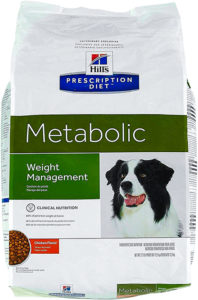
Whether you have a puppy, an adult, or a senior dog, proper nutrition is critical to good health. Only through optimal nutrition can your dog reach their full potential for growth, physical performance, healthy aging, and longevity.
At The Animal Clinic of Billings and Animal Surgery Clinic, we have spent decades educating pet owners about optimal nutrition for dogs of every size, age, lifestyle, and medical condition. Many of our clients are surprised to learn how important proper nutrition is to the quality of their dogs’ lives.
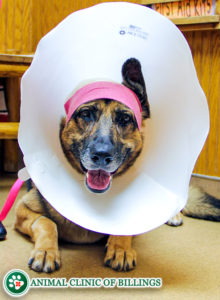
As with anything pertaining to your dog, it’s very important to always be open and honest with your veterinarian about what food you’re feeding your dog. Our veterinarians have seen many clients over the years hesitate to share with us what dog food they’re feeding because they are afraid or embarrassed that we might judge them for using anything other than the best of the best.
This couldn’t possibly be further from the case. We want to be here for you to offer as much help and guidance as possible, but we need all the facts to help us paint a complete picture of your dog’s health and nutritional needs.
Our veterinarians would love to help you select a diet to meet the individual nutritional needs of your dog. If you’re unsure of the best way to meet your dog’s nutritional requirements, please call us to schedule an appointment with one of our veterinarians today!
406-252-9499
What is the best dog food for puppies?
Puppy food is formulated to meet the increased nutritional demands of rapid growth and development. Puppies should be fed a scientifically formulated puppy food beginning at approximately four weeks of age, as they begin to wean off of their mother’s milk.
Young puppies do best when they eat at least 3 times per day. By 4 to 5 months of age, feeding frequency can be reduced to twice daily. Adhering to a strict feeding schedule will help establish a routine for your puppy that will, in turn, help with house training.
Overeating can become a problem in certain breeds if they are allowed to eat all they want, so do your best to monitor their weight and ask your veterinarian if your puppy might be developing any weight issues. Remember to refrain from overfeeding your puppy in an attempt to accelerate his or her growth, as growth rate is limited by genetics and excess energy will be converted to fat.
Each puppy is different, with individualized nutritional requirements. The right puppy food for your dog depends on many factors, including breed, size, growth rate, medical predispositions, and tendencies to overeat or self-regulate.
In particular, large and giant breed puppies have different requirements for mineral and energy content than small and medium breed puppies, so it is important to feed these individuals a puppy food formulated for their breed type. We recommend scheduling a nutritional consultation with one of our veterinarians to help you determine the best puppy food for your puppy.
What is the best dog food for middle-aged dogs?
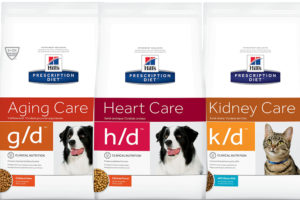 No single dog food is ideal for all dogs. It is best to choose a brand that employs veterinary nutritionists, conducts extensive research on animal nutrition, performs long-term feeding trials to ensure the nutritional adequacy of each of their diets, and implements extensive quality-control testing.
No single dog food is ideal for all dogs. It is best to choose a brand that employs veterinary nutritionists, conducts extensive research on animal nutrition, performs long-term feeding trials to ensure the nutritional adequacy of each of their diets, and implements extensive quality-control testing.
Unfortunately, many manufacturers encountered commonly in the pet food marketplace do not meet these requirements. Manufacturers that do meet these guidelines include Hill’s, Purina, and Royal Canin.
Beyond selecting a good adult diet, it is essential to feed the correct amount. Even when feeding an ideal diet, overeating can still have serious consequences for your dog’s health. Often, the recommended feeding amounts listed on dog food packaging are too high, and result in over-feeding and weight gain. Your vet can help you calculate the correct amount of your dog’s specific diet to feed each day.
The best way to address excess weight or signs of potential malnutrition or dietary deficiency (underweight, poor haircoat, low energy, etc.) is by implementing a responsible feeding plan designed by your veterinarian and choosing a veterinarian-recommended well-balanced and nutritious adult dog food.
What is the best dog food for senior dogs?
Every senior dog is different, and so are their nutritional needs as they age. As long as your senior dog is doing well on its current diet, then you may not need to change anything. However, it is not unusual for older dogs to develop health problems that could greatly benefit from special diets tailored to address these conditions.
Additionally, most senior dogs will have decreased caloric requirements as their metabolism slows, while their requirements for protein may increase as the efficiency of protein digestion and absorption decreases. Most senior diets are designed to accommodate this change in nutrient requirements by reducing the carbohydrate and fat content while increasing the amount of high quality protein.
For more information on dog nutrition, visit our dog nutrition page by clicking HERE.
Protecting Your Dog From Fleas And Ticks
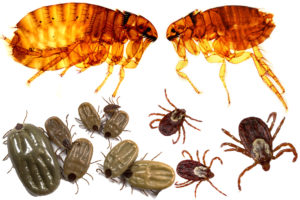
First and foremost, if your dog is not on a preventative flea and tick medication prescribed by a veterinarian, your dog has the potential to create a serious infestation of fleas or ticks in your home in just a few short weeks. It can happen that fast. Flea and tick medication is easy to obtain from a vet and is relatively inexpensive.
Fleas and ticks often carry diseases and parasites that can easily spread to your dog and present very serious health risks, making a proper flea and tick preventive protocol extremely important for both you and your canine companion’s overall health, quality of life, and safety.
Fleas and ticks can cause a variety of health problems in dogs as well as humans, including:
- Skin inflammation, irritation, and secondary infections
- Transmission of potentially life-threatening diseases (including Rocky Mountain Spotted Fever, Plague, Lyme, and others)
- Transmission of intestinal parasites
- Psychological distress from constant intense itching
If you suspect your dog is infested with fleas or ticks, please call us to schedule a veterinary appointment immediately. Our veterinarians know that flea and tick infestations can be terribly frightening and overwhelming, but we have the training and experience to effectively treat them. Call to schedule an appointment today with one of our veterinarians to discuss which flea and tick treatment option is best for your dog or cat. For more information on our dog flea and tick prevention services, visit our flea and tick services page for dogs by clicking HERE.
Dog Vaccinations
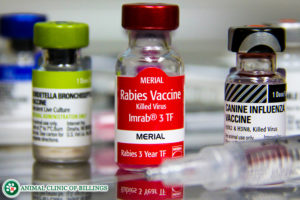
Vaccines are one of the most critically important aspects of any preventive care plan for dogs. Sometimes, a client will insist that their dog doesn’t need a vaccine that is recommended by one of our veterinarians because the disease the vaccine protects against is too rare or their dog has a low risk of exposure.
It’s important to understand that the only reason these diseases are so rare is because of large-scale vaccination of the canine population. If enough dog owners stop getting their dogs vaccinated, this will cause a swift resurgence of these deadly but easily preventable diseases.
Your veterinarian will recommend a proper vaccination schedule for your dog. Following your veterinarian’s vaccination recommendation will ensure your dog stays protected from diseases that seriously threaten your dog’s health, well-being, longevity, and quality of life.
A typical vaccination schedule for a dog consists of several immunizations given three times in 4 to 6-week intervals to your dog as a puppy, followed by vaccine boosters one year after that, and then less-frequently, but still periodically throughout the rest of your dog’s life as recommended by your veterinarian.
For more information on our dog vaccine services, visit our dog vaccination services page by clicking HERE.
Heartworm Prevention For Dogs
Heartworms are parasites transmitted by mosquitos that inhabit a dog’s (or rarely, a cat’s) heart. Over time, as heartworms grow and interfere with heart function, they cause heart and lung disease, which will ultimately be fatal if not treated.
Since 1981 the Animal Clinic of Billings has made heartworm prevention an integral component of our preventive care protocol for dogs. If a dog is infected with heartworms, their presence will lead to serious cardiac and pulmonary disease that is ultimately fatal. Therefore, heartworm prevention is very important.
At the Animal Clinic of Billings and Animal Surgery Clinic, our team of veterinarians and veterinary technicians are here to do everything we can to help protect your dog from this terrible disease.
For more information on our heartworm prevention services for dogs, visit our heartworm services page for dogs by clicking HERE.
Worms and Intestinal Parasites In Dogs
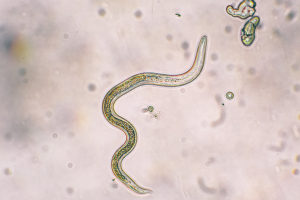
Almost every dog is at risk of contracting worms at various points throughout their lives due to their high level of outdoor exposure, social behaviors, and natural curiosity to investigate everything they come across.
Generally, treating worms in dogs has an excellent prognosis, as long as dogs receive treatment before the worms are allowed to progress into the advanced stages of infestation. If your dog is found to have a parasite, your veterinarian will prescribe an appropriate deworming medication, depending on the type of parasite, the extent of the infestation, and other medical considerations specific to your dog’s individual needs.
If you suspect your dog might have contracted intestinal worms or another parasite, please call us to schedule an appointment with one of our veterinarians right away. Our dedicated veterinary team is here to provide treatment options and help answer any dog parasite questions you might have.
 Puppy wellness exams and veterinary care for puppies
Puppy wellness exams and veterinary care for puppies
Bringing home a cuddly new puppy can be one of the greatest joys in life. At the Animal Clinic of Billings and Animal Surgery Clinic, our veterinarians know what an exciting time this is, and we want to help you start your new life together in the best and healthiest way possible.
Puppies are especially vulnerable to diseases and illnesses that can become very serious, but most of these are entirely preventable. In addition to vital puppy vaccinations and deworming, the key to maintaining your puppy’s health is diligently monitoring your puppy’s behavior for signs of illness as they mature.
During your puppies first vet visit, one of our veterinarians will conduct a complete physical exam, provide deworming medication, update all necessary vaccines, and spend time educating you on all of your puppy’s health needs.
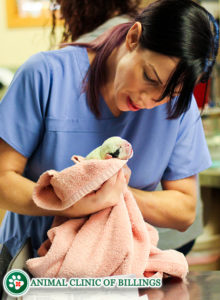
Our puppy health care services include:
- Wellness Examination Schedule
- Vaccinations
- Deworming and fecal parasite exams
- House training guidance
- Behavior advice
- Puppy nutrition guidance
- Spay/neuter education
By bringing your new puppy in for appointments at 8, 12, and 16 weeks old, you will be, “getting them off on the right paw” for healthy growth and development, and establishing a relationship that will promote a lifetime of health and wellness.
If any of the following symptoms begin to surface in your puppy, contact your vet immediately. All of the following symptoms indicate a medical emergency in puppies and require immediate veterinary care.
- Loss of appetite
- Lack of weight gain
- Vomiting
- Swollen or painful chest or abdomen
- Lethargy (tiredness)
- Diarrhea
- Difficulty breathing
- Wheezing or coughing
- Pale gums
- Red swollen eyes or eye discharge
- Nasal discharge
- Inability to pass urine or stool
For more information on veterinary care and preventive health care for puppies, visit our puppy care services page by clicking HERE.
Senior wellness exams and veterinary care for older dogs
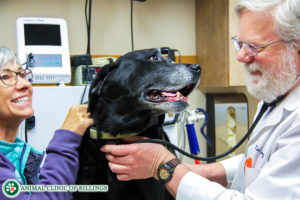
Animal Clinic of Billings veterinary exams
Unfortunately, as dogs get older, their risk of developing cancer increases. Fortunately there have been many advancements in veterinary medicine that enable dogs with a cancer diagnosis to live longer and fuller lives than ever before. Still, regular health care visits with your veterinarian are imperative as early detection is key to the most effective treatment.
Physical evaluations are an integral component of senior dog preventive care and wellness programs. Being obese or overweight is especially difficult for a senior dog and will impact their quality of life tremendously.
Senior physical examinations allow our veterinarians to determine if your senior dog is overweight, and if so, to design a diet and physical activity plan to restore your dog to their ideal body weight. Additionally, any unexplained weight loss or muscle atrophy could be a sign of illness.
Our veterinarians can identify any underlying conditions and institute the appropriate treatment, as well as teach you how to monitor your dog’s health and physical condition at home and what symptoms, if any, to watch for between visits.
During a senior dog wellness examination at the Animal Clinic of Billings and Animal Surgery Clinic, one of our veterinarians will conduct a thorough physical on your dog and discuss with you which of the following health care services may be needed for your dog.
- Senior Wellness Exam Schedule for your Dog
- Nutritional consultation
- Body condition evaluation
- Vaccinations
- Parasite control
- Dental care
- Pain management
- Mobility optimization
- Exercise recommendations
Pain Management
At the Animal Clinic of Billings and Animal Surgery Clinic, we believe strongly in the importance of preventing and managing anxiety and pain in our patients. It is important to keep in mind that in addition to causing discomfort, pain—particularly chronic pain—has numerous other detrimental effects on the body and mind, including delayed healing, physical deconditioning, impairment of the immune system, increased anxiety, insomnia, and interference with social interactions.
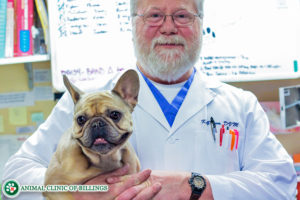 We routinely manage both acute pain—associated with surgery, injuries, infections, and other conditions—and chronic pain, such as that from arthritis, spinal or nerve diseases. We employ a variety of strategies in pursuit of the best possible pain management, including pharmaceuticals, nutritional supplements, laser therapy, ice, heat, massage, acupuncture, transcutaneous electrical nerve stimulation, therapeutic ultrasound, and underwater treadmill exercise.
We routinely manage both acute pain—associated with surgery, injuries, infections, and other conditions—and chronic pain, such as that from arthritis, spinal or nerve diseases. We employ a variety of strategies in pursuit of the best possible pain management, including pharmaceuticals, nutritional supplements, laser therapy, ice, heat, massage, acupuncture, transcutaneous electrical nerve stimulation, therapeutic ultrasound, and underwater treadmill exercise.
At the Animal Clinic of Billings and Animal Surgery Clinic, we believe that identifying and relieving pain is an essential component of your pet’s recovery. No dog should ever have to suffer pain when it can be managed. Our veterinarians will develop a unique pain management plan to meet your dog’s individualized pain relief needs and optimize their comfort and wellbeing.
Schedule A Veterinary Appointment For Your Dog Today!

Let our highly trained and experienced team of veterinarians and veterinary technicians help you keep your dog as happy and healthy as they can be.
406-252-9499


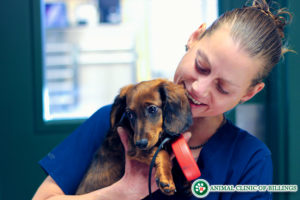 Puppy wellness exams and veterinary care for puppies
Puppy wellness exams and veterinary care for puppies
